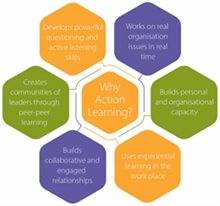Vision on Learning
Our vision on Learning: Action Learning
Action learning is a powerful and dynamic approach to learning and problem-solving that has several benefits.
- Problem Solving: Action learning is centered around addressing real-world problems and challenges faced by individuals or organizations. Participants work collaboratively to identify and solve these problems, leading to practical and applicable solutions.
- Learning by Doing: The emphasis on action in action learning means that participants actively engage in the learning process. This hands-on approach fosters experiential learning, helping individuals acquire new skills and knowledge by directly applying them in real-life situations.
- Team Development: Action learning typically involves small groups or teams working together to tackle problems. This promotes teamwork, communication, and collaboration, enhancing the overall effectiveness and cohesion of the group.
- Skill Development: Participants in action learning programs often develop a range of skills, including problem-solving, decision-making, communication, and leadership. These skills are not only valuable in the specific context of the program but can also be applied in various other personal and professional situations.
- Knowledge Transfer: Action learning provides a platform for the sharing and transfer of knowledge within a group. Participants bring diverse perspectives and expertise, contributing to a rich learning environment where insights from different fields can be applied to the identified challenges.
- Increased Motivation and Engagement: The practical nature of action learning can lead to increased motivation and engagement among participants. The direct connection between the learning process and solving real-world problems can be more stimulating and meaningful than traditional classroom-based learning.
- Organizational Learning: In the context of organizations, action learning can contribute to a culture of continuous learning and improvement. Teams or departments that engage in action learning can become more adaptive and better equipped to navigate complex challenges.



